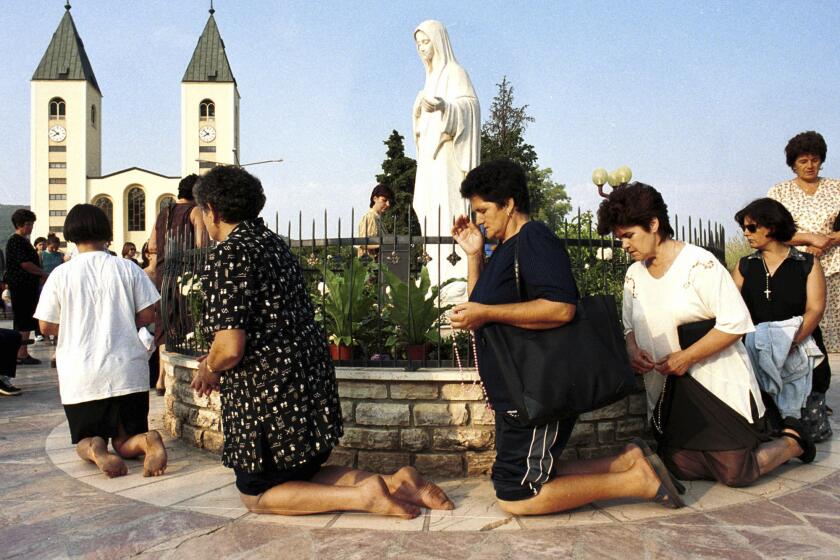Housing Code Defines What Makes a Family
The last of the moving boxes has been put away, and the basketball hoop is installed next to the garage door. The refrigerator is covered with vacation snapshots and notices of an upcoming PTA meeting. Yet Olivia Shelltrack and Fondray Loving and their three kids are not yet settled into the sprawling five-bedroom home they bought in January.
In this middle-class suburb of St. Louis, about 14 miles north of downtown, city leaders have ruled that because the couple are not married, they and their children don’t belong.
Last week, the Black Jack City Council rejected a measure to change the law prohibiting more than three people from living together in the same house if they are unrelated by blood, marriage or adoption. To help enforce the law, anyone moving into a house in Black Jack, as an owner or renter, is required to go to City Hall, show identification for every resident and obtain an occupancy permit.
Shelltrack and Loving, who have lived together for 13 years, said they did not know about the law when they bought their two-story yellow house early this year. The couple have two children together, and Alexia, Shelltrack’s teen daughter, has called Loving her father since infancy.
“I don’t get it,” said the couple’s middle child, 10-year-old Katarina Loving. “My mom and dad love each other. What’s the big deal?”
The debate over how to define “family” has become increasingly heated after decades of changing social norms. And a growing number of urban and suburban communities are putting their foot down and turning to housing and zoning laws to say what is -- and isn’t -- a family, said Frank S. Alexander, interim dean of Emory University’s School of Law in Atlanta.
“It’s a not-so-veiled attempt to control who lives down the street and [to] legislate relationships,” said Alexander, who teaches a course on how housing laws define America’s families. Though it happens across the country, he said, “no other state has so many of these laws in place as Missouri.”
Occupancy laws have more typically been used to restrict establishment of boarding houses and fraternities in single-family neighborhoods, said Alexander.
In Black Jack, the law is designed to prevent overcrowding, Mayor Norman C. McCourt said in a statement. He also noted that no federal or Missouri law bars housing discrimination based on marital status. Some states do bar discrimination based on marital status, but Missouri is not one of them. The state also does not recognize common-law marriage. In the last presidential election, a fourth of state voters cited moral concerns as the key issue.
In Black Jack, officials note that at least 80 of the 91 municipalities in St. Louis County have occupancy ordinances on the books similar to theirs. But few have been as aggressive at enforcement as Black Jack, said Tony Rothert, legal director for the American Civil Liberties Union of Eastern Missouri.
The town, incorporated in 1970, is filled with cozy neighborhoods nestled among rolling green hills and oak-lined streets. According to census data, the median age is 37 and the median household income is nearly $52,000 a year. About 70% of the population is African American.
After Shelltrack and Loving pleaded with the City Council to alter or remove the 1985 ordinance, officials considered changing the law’s definition of family to include “two unrelated persons” with children. But council members rejected the measure, 5 to 3. The four who could be reached declined to comment.
ACLU officials said they knew of at least four instances, in addition to Shelltrack and Loving, where unmarried couples were denied an occupancy permit in Black Jack.
In 1999, Duane Carpenter and Doris McKinney, who have triplets, came up against the ordinance. In a letter addressed to the ACLU of Eastern Missouri, the mayor wrote: “The easiest resolution to cure the situation would be for them to be married. Our community believes that this is the appropriate way to raise a family.”
The couple eventually left.
“If this were about density, then why isn’t the city focusing on the number of cars parked in front of a property? Or tracking the number of children enrolling in schools?” the ACLU’s Rothert said. “To say that five people can’t live in a 2,400-square-foot house because of density concerns is ridiculous. To say that this couple would be OK if they had only one child instead of three is crazy.”
But Missouri’s higher courts have upheld similar laws. In the 1980s, Joan Kelly Horn and her partner, Terrence Jones, were living in the St. Louis suburb of Ladue when a police officer knocked on their front door and demanded to see a marriage certificate. The couple, raising seven children from previous marriages, said they planned to marry but had decided for economic reasons to wait.
“They told us point-blank, either get married or leave,” said Horn, who served in the U.S. House of Representatives in the early 1990s.
The couple sued, but lost at the state appellate court in 1986. They married the following year, and divorced in 1999. The two then left Ladue.
Advocates say communities are just defending local standards.
“They have the right to protect and restore a marriage-based moral order,” said Robert Knight, director of the Culture and Family Institute at Concerned Women for America, a public policy organization based in Washington, D.C.
Shelltrack, a 31-year-old stay-at-home mom, and Loving, a 33-year-old customer service manager for a payroll company, lived in Minneapolis for nearly a decade before moving to Black Jack. They decided to relocate to the St. Louis area to be closer to Loving’s extended family, and were drawn to Black Jack’s close-knit feel and school system.
“We took one look at the house and knew we were home,” Shelltrack said. “It was on a half-acre of land, had lots of room and we could afford it.”
After their application for an occupancy permit was turned down, the couple tried to appeal to the city for an exemption. According to a recording of a meeting with city officials, Black Jack Board of Adjustment member Norma Mitchell told the couple: “I do not see the advantage of living with a man without a marriage license.... Ma’am, why would you deny your rights of being married to him?”
Shelltrack replied: “I have the right to not be married.”
Shelltrack and Loving said their families had asked whether the couple wouldn’t be better off putting the house up for sale and finding a different neighborhood to call home.
But the couple, who have not yet been fined, have decided to stay and fight.
The ACLU is helping them file a lawsuit against the city. The U.S. Department of Housing and Urban Development has launched an investigation into whether the city ordinance violates federal fair housing laws.
If they lose, the couple could be assessed a fine of $500 for every day they live in their home in Black Jack.
More to Read
Start your day right
Sign up for Essential California for news, features and recommendations from the L.A. Times and beyond in your inbox six days a week.
You may occasionally receive promotional content from the Los Angeles Times.






